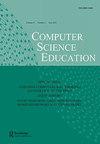探讨学生和讲师对计算机科学课程中合作与合作的看法-一项定性分析
IF 2.2
Q1 EDUCATION & EDUCATIONAL RESEARCH
引用次数: 5
摘要
背景与背景协作与合作学习对于学生为未来的工作做准备和提高他们在大学课程中的学习成绩非常重要。一些研究显示了关于团队活动的有希望的结果,比如结对编程。然而,关于目前如何将团队合作纳入计算机科学专业的大学课程以及成功纳入团队合作的具体障碍的信息很少。目的通过对学生和讲师的访谈,了解团队合作在计算机科学课程中的实施情况。我们考察了实施了哪些合作和协作学习方法,追求了哪些目标,以及如何指导和评估团队合作。方法对德国三所大学的25名教师和学生进行半结构化访谈。在内容分析中,我们分别对学生数据和教师数据进行了分析,最后对两种观点进行了讨论。课程缺乏讲师的教学设计和指导,学生希望在使用协作工具方面得到更多的指导和解释。要成功地将团队合作纳入计算机科学课程,以下几个方面是至关重要的:基于学习目标、学习者特征、上下文因素和评估一致性的协作和合作学习活动的彻底教学设计。本文章由计算机程序翻译,如有差异,请以英文原文为准。
Exploring students’ and lecturers’ views on collaboration and cooperation in computer science courses - a qualitative analysis
ABSTRACT Background and Context Collaborative and cooperative learning is important to prepare students for their future work and to increase their learning performance in university courses. Several studies have shown promising results regarding team activities, such as pair programming. However, there is little information on how teamwork is currently included in university courses for computer science students and the specific obstacles to its successful inclusion. Objective To get an overview of the implementation of teamwork in computer science courses, we interviewed students and lecturers. We examined which cooperative and collaborative learning methods are implemented, which goals are pursued, and how the teamwork is guided and assessed. Method Semi-structured interviews with 25 lecturers and students were conducted in three universities in Germany. We analyzed the students’ data separately from the teachers’ data, in a content analysis, and discuss both views in the end. Findings Courses lack instructional design and guidance by the lecturer, and students wish to get more instructions and explanations in using collaborative tools. Implications To successfully include teamwork in computer science courses the following aspects are crucial: thorough instructional design of collaborative and cooperative learning activities based on learning objectives, learner characteristics, contextual factors, and alignment of assessment.
求助全文
通过发布文献求助,成功后即可免费获取论文全文。
去求助
来源期刊

Computer Science Education
EDUCATION & EDUCATIONAL RESEARCH-
CiteScore
6.90
自引率
3.70%
发文量
23
期刊介绍:
Computer Science Education publishes high-quality papers with a specific focus on teaching and learning within the computing discipline. The journal seeks novel contributions that are accessible and of interest to researchers and practitioners alike. We invite work with learners of all ages and across both classroom and out-of-classroom learning contexts.
 求助内容:
求助内容: 应助结果提醒方式:
应助结果提醒方式:


